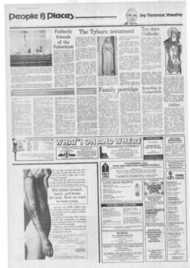Page 1, 19th July 1985
Page 1

Report an error
Noticed an error on this page?If you've noticed an error in this article please click here to report it.
Tags
Share
Related articles
Split Fear In Embryo Battle
Pro-life Lobby Sense Victory In Commons' Poll
'no New Thought' In Dhss Paper Aimed At 'bamboozling' Public
Pro-lifers Push For End To Destructive Experiments
Clash Over Use Of Human Embryo Research
Pro-Life lobby issues challenge on embryos
A NEW campaign aimed at forcing parliamentary legislation to outlaw experimentation on human embryos was launched earlier this week, but divisions as to the best tactics to employ towards that end appeared within the pro-Life lobby.
Al the Methodist Central Hall in Westminster on Monday
prominent MPs, including Enoch Powell whose embryo bill was "talked out" in the Commons earlier this year, addressed a rally organised by the Society for the Protection of tinhorn Children (SPUC).
Sir Bernard Braine MP, of the All-Party Parliamentary Pro Life Group, issued an outspoken warning to the Government that if they did not come up with their own legislation on the Warnock proposals in the next parliamentary session, a number of pro-Life MPs would initiate private members bills along the lines of the Powell proposals "one after another".
He added: "Anyone who imagines that the shoddy tactics used to block the Powell hill would cause us to give up the fight had better think again".
"Shoddy was also an adjective employed later by Mr Powell himself to describe the Warnock report, commissioned by the DIISS as an investigation of human embryology and fertilisation. He attacked those who had claimed that experimentation on human embryos could lead to the discovery of cures for diseases such as Downs Syndrome and Cystic Fibrosis. Mr Powell had found no evidence whatsoever of any such experimentation in clinics in this country.
Warnock had failed to ascertain what experiments were in progress, or if there weren't any, why not. Instead of presenting "a vigorously argued case f or their recommendations", the committee had "taken for granted the desireability of embryo experiments and jumped
straight ahead to propose how they should he regulated and licensed".
If they had asked the questions, why had they not presented the answers, Mr Powell asked and hinted to his audience that those responses might have been "suppressed".
In another move designed to keep the debate on the embryo question alive, Catholic MPs William Cush and David Atkinson last week joined former Ilealth Minister, Gerard Vaughan, in tabling an early-day motion calling on the cGoomvemrintniteeenti) on hsenit u aunp aemsbeiryecot research and genetic engineering.
The move has the hacking of Life, the anti-abortion organisation, but was rejected this week by the All-Party ProLife Group in Parliament and by SPUC.
Mrs Phyllis Bowman of SPUC described it as an "idiotic" tactic which would "let the Government off the hook" by allowing them to set up another committee. She preferred the course of direct
private °a members' in mparliamentbers bills.
' lls. through However, Mrs Nuala Scarisbrick, Administrator of Life, defended the Cash motion. It would keep the embryo issue in the front of public opinion, and would allow a parliamentary group, compared to the non-parliamentary composition of the Warnock committee, to lake into account changes in embryo technology which have occurred since organisations such as Life made their reports to Warnock in 1982.
With a parliamentary committee there was a much greater chance of influencing the composition so as to reflect the true wishes of the House as expressed in the two majority votes for the Powell plans, Mrs Scarisbrick said.
blog comments powered by Disqus











